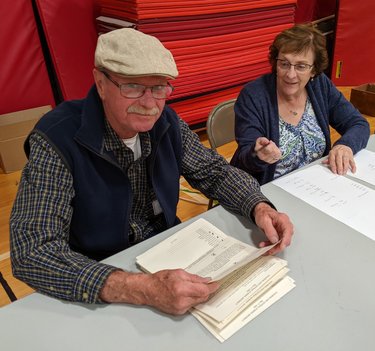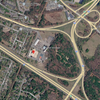GCSD taxes to increase more than projected
GUILDERLAND — On Tuesday, the school board here set the tax levy for next year’s budget at rates higher than estimated when voters approved the spending plan in May.
The district had thought taxes would increase 2.98 percent. Knox residents will see the biggest jump, at over 13 percent as that town hasn’t revalued properties in a quarter century.
“We just follow the math,” said Assistant Superintendent for Business Neil Sanders as he explained to the school board how the rates are determined.
The lion’s share of the school district is located in Guilderland with parts of the district also located in the towns of Bethlehem, Knox, and New Scotland. The levy in Guilderland will pay for about $72 million of next year’s budget.
Bethlehem residents and businesses will pay for about $5 million; Knox for about $562,000; and New Scotland for about $315,000. Also, about $30 million of the $110 million budget is to be covered by state aid.
The tax rate for Guilderland residents and businesses will go up 4.84 percent rather than the 2.98 percent predicted last spring.
This is because the taxable valuation in town decreased by nearly $80 million from the $4 billion estimated in April.
So Guilderland residents will pay $18.20 per $1,000 of their property’s assessment.
Guilderland underwent townwide property valuation in 2019, for the first time since 2005, which lowered the tax rate in Guilderland by over 27 percent that year and at the same time lowered the rates in the other three towns to a lesser extent.
Last week, The Enterprise reported that the Guilderland school district had in June paid over $3 million in tax refunds to property owners who had successfully challenged their assessed values, draining the district’s Tax Certiorari Reserve and causing it to borrow.
“It just seems unfortunate that the district needs to pay when they’re not involved in the actual assessment,” said board member Blanca Gonzalez-Parker at Tuesday’s meeting.
Sanders explained that most towns can’t afford revaluation every year so an equalization rate is set so that people in different municipalities pay their fair share of taxes.
An equalization rate of 100 percent would mean properties in town are at fair market value. Guilderland’s equalization rate is now at 91 percent, meaning that assessments are 9 percent below the current fair-market value.
The median full-market value for a home in Guilderland is $273,626 while the median assessed value is $249,000.
These are the tax rates for the other three towns partly in the Guilderland school district:
— In Bethlehem, which had last reassessed eight years ago, the median assessed value of a home is $235,318, and the equalization rate is 86 percent.
Taxable valuation went up close to $3 million from the April estimate.
The district had estimated in April that Bethlehm taxes would go up 2.98 percent but they will actually go up 3.17 percent to $19.26 per $1,000 of assessed value;
— In New Scotland, which had last reassessed 16 years ago, the median assessed value of a home is $221,637, and the equalization rate is 81 percent.
Taxable value decreased about $111,000 from the April estimate.
The district had estimated that New Scotland taxes would go up 2.98 percent but they will actually go up 7.19 percent to $20.45 per $1,000 of assessed value; and
— In Knox, which last reassessed 25 years ago, the median assessed value of a home is $114,923, and the equalization rate is 42 percent.
Tax valuation increased about $52,000 from the April estimate.
The district had estimated that Knox taxes would go up 2.98 percent but they will actually go up 13.58 percent to $39.43 per $1,000 of assessed valuation.
“Twenty-five years seems incredibly long,” said board member Rebecca Butterfield of the time since Knox’s last revaluation.
Sanders replied that there is no legal requirement for town’s to revalue property.
Transition
Superintendent Marie Wiles reported on successful summer programs and also updated board members on dates for the fall reopening of schools.
Summer school programs end next week, said Wiles, reporting that 14 middle school students had attended classes at Schalmont while 76 high school students attended fully virtual classes through Guilderland.
Students with disabilities learned at Guilderland Elementary this summer while students learning English as a new language studied at Westmere Elementary.
Staff will return to school on Aug. 31 for professional development while students return to class on Tuesday, Sept. 6. In preparation, sixth-graders will visit the middle school and ninth-graders will visit the high school on Sept. 1.
Meal prices
The board approved prices of $1.95 for breakfast at the five elementary schools and $3 for lunch. At the middle school and high school, breakfast will cost $2.50 and lunch will cost $3.25.
During the pandemic, the federal government paid for all students to eat for free. Now, the federal government is returning to its original program of families applying for reduced-price or free meals, based on income.
Gonzalez-Parker asked if parents were notified when there is a food shortage so students could bring their lunches.
Sanders speculated that more children may bring lunches this year since the food at school is no longer free. “It was great; it was needed,” he said of the free meals for all during the pandemic.
Board member Kimberly Blasiak said that last year, during later lunch periods, some high school students said, “We don’t have food.” Blasiak added, “I have a problem with that.”
“We do our best,” said Sanders, urging trust. He noted that the district is adding storage space for the upcoming school year.
Supply-chain issues had caused some shortages. “We’ll probably face some of the same challenges,” said Sanders who said he was “hoping for more consistent distribution.”
He went on, “We have alternates we can go to in case something doesn’t come in … We also are doing some shared purchases.”
Last year, Sanders said, Guilderland would borrow from other districts when needed and then pay back the items when they arrived.
Butterfield said she was aware of districts elsewhere penalizing students for overdue balances and she wanted to make sure Guilderland doesn’t do that.
“No, we don’t do that,” said Sanders.
Other business
In other business at its Aug. 9 meeting, the Guilderland School Board:
— Heard a request from Marie Rivera that Guilderland send more than one student each year to Tech Valley High School. Rivera’s daughter had attended Tech Valley summer camp and “her experience was amazing,” Rivera said;
— Heard a request from Andrew Genovese that Guilderland tell the community what the district is specifically doing to make sure all students are “future ready.” He cited an Enterprise article quoting Wiles as saying the district’s mission is “Making sure all students, and by that we mean each and every one ... are future ready, ready for whatever comes ahead.”
Genovese said, “Since the future is uncertain and, as Einstein said, we cannot solve problems on the same level of consciousness that created them, we need more than the current, common methods and ideologies”;
— Heard from Assistant Superintendent for Curriculum and Instruction Rachel Anderson that Guilderland High School has been recognized as a Scholar-Athlete School of Distinction by the New York State Public High School Athletic Association. This means all 31 of Guilderland’s varsity teams received the Scholar-Athlete team award during their respective sports seasons; 86 schools earned the award;
— Approved service, consultant, and transportation agreements for the upcoming school year as well as purchases, to the lowest bidders, for paper towels and fresh milk;
— Agreed to operate a combined ice hockey team with Scotia-Glenville, Mohonasen, Schalmont, and Voorheesville for the upcoming school year. “None of the schools have enough ice-hockey players to field a team of their own,” said Sanders;
— Agreed to discard ballots older than six months, which is past the appeals date, to free up storage space;
— Agreed to dispose of obsolete tech equipment including 1,555 Chromebooks, 404 Cisco Access Points, and 121 Elmo Document Camera — all of them listed in “fair” condition.
Board member Judy Slack asked if the items — a list of 18 different kinds of equipment — could be sold.
“It’s not great money,” said Sanders. “These are beyond their useful life,” he said, adding they may be useful for someone who doesn’t “need the latest and greatest.”
David Howell , the district’s director of technology, said more items were kept on than usual because of COVID and many don’t work with the latest programs; and
— Adopted the state-required Project SAVE, which stands for or the Safe Schools Against Violence in Education Act, plan and professional development plan.



